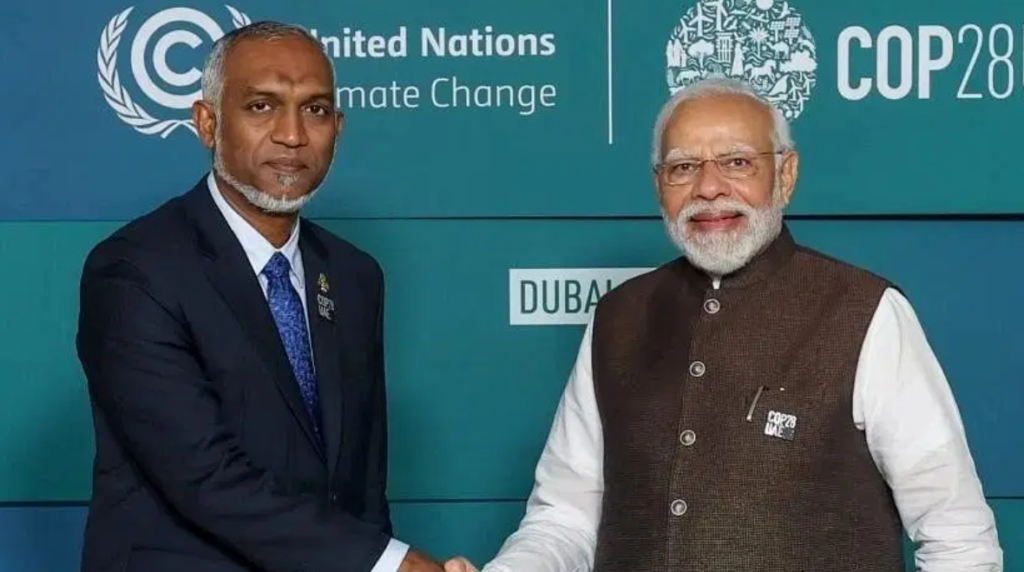In a resolute return from China, President Mohamed Muizzu delivered a strong message, seemingly directed at India, asserting that the Maldives, though small, won’t tolerate bullying.

Why there is Indian military in Maldives?
The President, elected in September, has been at the center of strained relations with India, demanding the withdrawal of Indian troops and discontinuing joint initiatives. Recent controversies, involving criticisms by junior ministers and subsequent suspension, led to social media tensions between both nations.
A Diplomatic Dance: China and Maldives Strengthen Ties
Amid the diplomatic turbulence, President Muizzu utilized his visit to China to bolster ties. Urging Chinese tourists to reclaim the top spot in arrivals, he oversaw the signing of 20 MoUs, emphasizing a strategic partnership and supporting China’s Belt and Road initiative. In a press conference at Velana International Airport, Muizzu revealed China’s agreement to negotiate deferred or eased loan repayment terms, demonstrating China’s commitment to the Maldives’ development.
“We may be small, but this doesn’t give them the license to bully us,” asserted Muizzu during a press conference, hinting at India’s perceived interference.
The joint statement by China and the Maldives emphasized mutual support in safeguarding core interests and opposing external interference in Maldives’ internal affairs. President Muizzu, while appealing to China to intensify tourism efforts, highlighted the historical respect and support between the two nations.
Why there is Indian military in Maldives?
As per recent government data, there are currently 88 Indian military personnel stationed in the Maldives. These soldiers are deployed for training Maldivian troops in combat, reconnaissance, and rescue-aid operations at different intervals.
Why Maldives is boycotted by India?
Tensions between the Maldives and India escalated with Muizzu’s election, marked by demands for troop withdrawal and the discontinuation of joint initiatives. The recent controversy involving social media criticisms led to a “Boycott Maldives” campaign in India, threatening the vital tourism industry of the archipelago. The Maldivian government distanced itself from the remarks, suspending the involved ministers.
“The two sides agree to continue firmly supporting each other in safeguarding their respective core interests,” the joint statement affirmed.
As President Muizzu’s remarks in Male signal a firmer stance, the ongoing diplomatic row remains a challenge for both nations. While he refrains from direct comments, the consequences of strained relations are palpable. The Maldives, navigating its path between global powers, seeks to maintain sovereignty, striking a delicate balance amid the complexities of international diplomacy.
In this intricate dance of diplomacy, the Maldives remains steadfast, asserting its independence and national dignity. President Muizzu’s visit to China serves as a strategic move to diversify alliances, underlining the importance of international partnerships while safeguarding the interests of the Maldivian people. The unfolding scenario prompts a closer look at the geopolitical dynamics shaping the future of the Maldives on the global stage.